The fact that after a year of a deep-freeze in bilateral security cooperation, the two governments reinitiated the top-level security dialogue is good. But negotiating a meaningful new deal will be a challenge, writes Vanda Felbab-Brown. The areas of overlap in preferred security policies by the two countries is minimal, and vastly inadequate for reducing the flows of deadly fentanyl from Mexico to the United States and strengthening rule of law in Mexico. This piece was originally published by Mexico Today.
On October 7 and 8, a cabinet-level delegation of U.S. officials met with President Andrés Manuel López Obrador and his cabinet for the start of a High-Level Security Dialogue to fashion new U.S.-Mexican security cooperation. The fact that after a year of a deep-freeze in bilateral security cooperation, the two governments reinitiated the top-level security dialogue is good. But negotiating a meaningful new deal will be a challenge. The areas of overlap in preferred security policies by the two countries is minimal, and vastly inadequate for reducing the flows of deadly fentanyl from Mexico to the United States and strengthening rule of law in Mexico. Mexican drug trafficking and criminal groups have been controlling more and more territory, acting with brazen impunity, and have augmented their efforts to penetrate further the already vastly coopted and corrupted Mexican law enforcement apparatus and political system.
Since taking office, López Obrador has sought to dismantle the Merida Initiative, the most extensive U.S.-Mexican security cooperation in history. Weakening for years, the bilateral security cooperation took a nose dive last year when the United States first arrested a former Mexican Secretary of Defense on drug trafficking charges, and then under diplomatic pressure handed him to the Mexican government; and yet Mexico still passed a new security law eviscerating security collaboration.
Constrained by an overriding desire to stop migration from Central America and also again from Mexico to the United States, the U.S. government has been bending backwards to be positive about prospects for collaboration under the new U.S.-Mexico Bicentennial Framework for Security, Public Health and Safe Communities. Secretary of State Anthony Blinken emphasized all the themes the Mexican government wanted to hear: being “equal partners”, having “shared responsibility” (which also underpinned the Merida Initiative), and tackling issues of high importance to López Obrador such as inequality and corruption and emphasizing public health approaches as part of the security cooperation framework. But negotiating a new deal that has any meaningful capacity to reduce violence in Mexico, criminal infiltration in Mexican institutions, and drug flows to the United States will be a long and complex process.
The underlying reality is that the López Obrador administration is not interested in the fundamental issue of tackling organized crime groups in Mexico with force, — indeed, of tackling them at all. Over the past three years, the Mexican government repeatedly refused to forcefully respond to criminal groups even as they invaded and tried to take over entire municipalities, engaged urban warfare, and systematically poured money and violently intervened into Mexican elections to manipulate them. Nor has the government exhibited much of any interest in accommodating the United States on the core issue of disrupting the trafficking of fentanyl and fentanyl-laced drugs, such as prescription pills, into the United States – even though fentanyl kills tens of thousands of Americans yearly and is increasingly making its way into drug consumption in Mexico. Opioids, most now laced with fentanyl, killed more than 93,000 Americans in 2020, yet another record year; and the flow of fentanyl-based fake prescription pills from Mexico to the United States jumped by nearly 430%! since 2019. U.S. bargaining over the new security framework is thus undermined not just by the specter of migration, but also by the fact that the López Obrador administration would remain perfectly happy watching the remnants of security collaboration wither.
The Mexican government has declared its interest in collaboration on only a very narrow set of issues: reducing weapons trafficking to Mexico, financial intelligence to capture funds diverted through corruption and other illicit proceeds, inchoate socio-economic programs that hope to have some effect on reducing crime, and unspecified public health approaches. What it is not interested in is mounting a meaningful and improved law enforcement effort against Mexican criminal groups.
Nor has the Mexican government exhibited an interest in strengthening civilian law enforcement capacities in Mexico. It has torn down the most potent civilian police agency, the Federal Police, thus throwing out years of efforts and bags of money. Like in the Calderón and Enrique Peña Nieto administrations, efforts to strengthen and clean up Mexico’s weak and infiltrated municipal police forces remain inadequate. And the López Obrador administration has rolled back efforts to build up a stronger, more effective and accountable, and less corrupt judicial system in Mexico.
That the United States will counter and ideally stop the illegal flow of weapons to Mexico has been a long-standing demand of the Mexican government. Since December 2008 (when the Merida Initiative was signed) the United States has steadily increased its focus on countering the flows. But the challenge is immense — constrained by U.S. pro-gun laws among many issues — and progress has been slow. And when a sting operation (an essential and highly effective tool in all law enforcement efforts) blew up in mistakes and mismanagement in the Fast and Furious Operation, and the Mexican government kept making diplomatic hay out of it, U.S. anti-weapons-smuggling efforts retreated into safe limited approaches.
The United States should clearly continue to strengthen efforts against weapons smuggling. However, even if there were a dramatic reduction in the illicit arms flows in Mexico, only some violence reduction would follow. The wide availability of weapons allows Mexican criminal groups to give high-power firearms to raw recruits who have no weapons skills and to send eighteen-year-old local gang kids to shoot up a place in order to kill one victim, indifferent to collateral damage. But it is the utter sense of impunity of Mexican criminal groups and their indifference to killing civilians in the crossfire, and their desire to terrorize communities that drives to them to employ these methods. U.S. weapons may enable such behavior, but it is the fact they the groups face no law-enforcement punishment for such behavior, especially under the López Obrador administration, that makes them willing to resort to such methods.
Financial intelligence can be a powerful tool to counter criminal groups, not merely or especially because it can recover stolen or illicit proceeds, but because it allows law enforcement agencies to develop a comprehensive picture of criminal networks and to enable the arrests of both critical operators and much of the network. In asking the United States to chase Mexican illicit money hidden in the United States, the Mexican government is replicating what the López Obrador administration has, without great success, tried to do at home: to fund the desired economic redistribution efforts, amidst a deeply contracted economy badly hit by Covid-19 and mismanaged by López Obrador, through the recovered stolen and illicit proceeds. However, even if in a dream world, financial intelligence on both sides of the border could recover vast sums, it will be of limited effectiveness in strengthening the rule of law in Mexico if the Mexican government continues to use it only against its political rivals and refuses to arrest criminal networks.
Addressing root causes has been part of the Merida Initiative since its second version: “Beyond Merida” negotiated during the Obama administration.Addressing root causes has been the Pilar IV of Beyond Merida – Building Resilient Communities. Neither the Calderón nor Peña Nieto administration took to that stream of efforts, the latter ultimately completely defunding it. The López Administration has so far unveiled only very vague plans to use socio-economic policies to address crime — essentially assuming that any schooling and grant programs for the young will reduce crime, a very long-term proposition at best and one that is not very likely to materialize. It was the under-specification of such anti-crime socioeconomic programs and their lack of integration with effective policing that undermined the prior versions of socio-economic anti-crime efforts in Mexico. There are good reasons to be skeptical that López Obrador’s tree planting scheme will dissuade rural populations from criminality, particularly if their municipalities are controlled by criminal groups. Not does there seem to be much ecological sophistication to the tree-planting scheme: mono-species tree plantations do not make for healthy biodiversity or sufficiently offset López Obrador’s throwing away green energy efforts in Mexico and embracing the unmodernized dirty fossil fuels.
Public health approaches – namely, treating substance-use disorder as a medical issue, and not criminal one, is absolutely right. As are life-saving measures such as safe-needle exchange for injectable drugs and overdose-reversing medications. But they will not stop the Cartel Jalisco Nuevo Generación from taking over municipalities with terror tactics, shooting up top-level Mexican security officials in the center of Mexico City, or the Sinaloa Cartel from holding a city hostage.
Violence reduction in Mexico is critical, but it requires effective law enforcement. Yes, getting away from a narrowly-cast high-value targeting that has augmented criminal violence in Mexico and problematically fragmented the Mexican criminal market and its proclivities toward spiraling out-of-control violence is very important.
But giving up on countering Mexican criminal groups with law enforcement, as the López Obrador administration has been doing over the past three years, is not the answer. Instead of narrow-high-value targeting only, law enforcement efforts should switch to targeting the middle-operation layer of criminal networks and seek to arrest as much of the network at once as possible. But that requires beefing up intelligence capacities of the Mexican government, and meaningfully investigating and countering the vast corruption and criminal infiltration of Mexican criminal groups into law enforcement forces, not sabotaging such efforts, as the López Obrador administration did in the U.S. arrest of General Salvador Cienfuegos.
Reaching a bilateral deal that centers on the above themes of interest to the Mexican government may not be so hard. But bringing in the inescapable and essential, modernized and improved, law enforcement component, will be hard, given the disinterest of the Mexican administration. The United States may be left with predominantly countering the flow of fentanyl on its own –as it has been in its recent operations against fentanyl-laced prescription drugs manufactured by Mexican criminal groups and trafficked by them into the United States — if the Biden administration accepts a security framework that lacks a focus on modernizing and strengthening Mexican law enforcement and countering Mexican criminal groups.
That would be bad, not just for the United States, but also for Mexico: How many more years of 30,000 Mexican citizens dying annually from criminal violence will Mexico tolerate? The only silver lining of such a deal would be that it exposed the inadequacies of efforts to counter violent criminality without serious smart law enforcement. But at what terrible costs in Mexico and in the United States!
The Biden administration has been handling López Obrador with velvet gloves. But it has some powerful guns as well. Instead of merely sanctioning designated individuals within the Cartel Jalisco Nueva Generación, it can designate Mexican criminal groups in their entirety as terrorist organizations – a very clumsy hammer that does not allow for much nuance and carries problematic side-effects, but that gives a lot of bang that would attract the attention of the López Obrador administration. Or it could delay any reopening of the U.S-Mexican land border– an issue of high priority to the Mexican government — and even seriously slow down flows from Mexico to the United States if Mexico remains unresponsive to the need to develop and deploy effective law enforcement against Mexican criminal groups and the flows of fentanyl from Mexico to the Unites States.
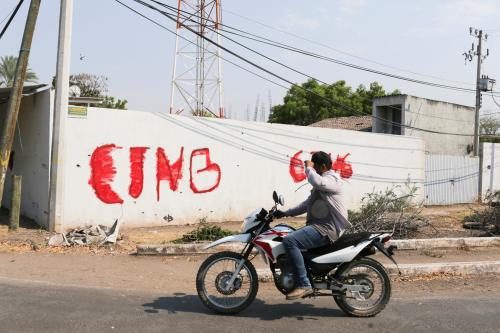
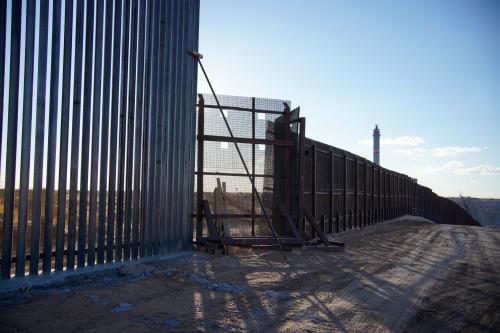
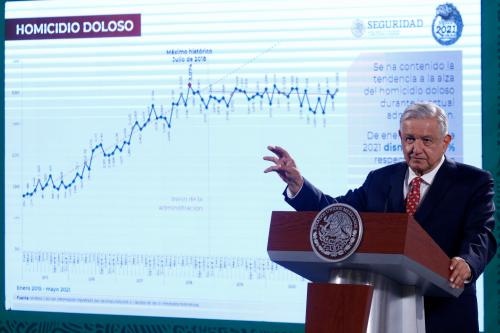

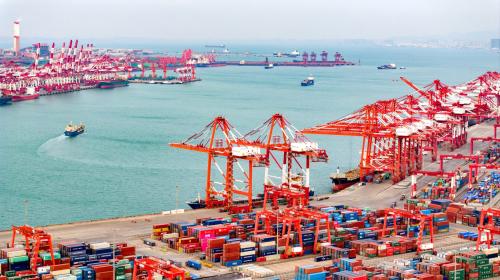
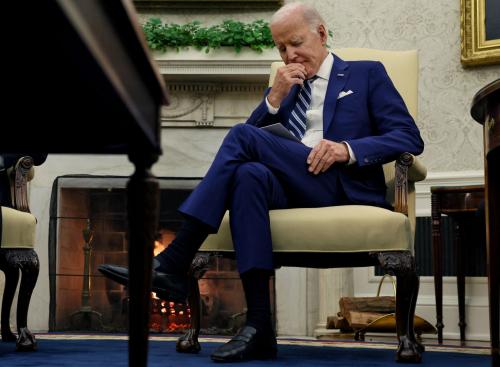

Commentary
Op-edThe travails of the US-Mexico High-Level Security Dialogue
October 9, 2021